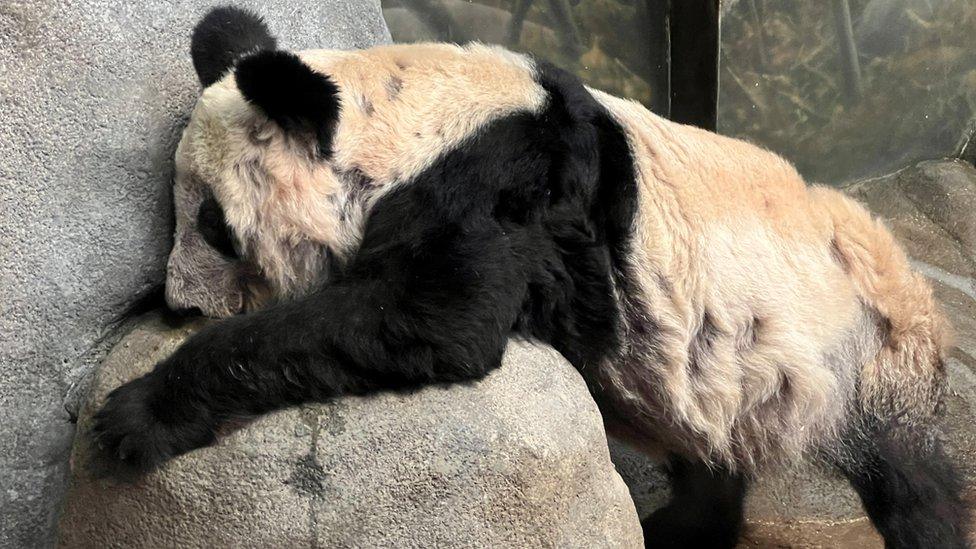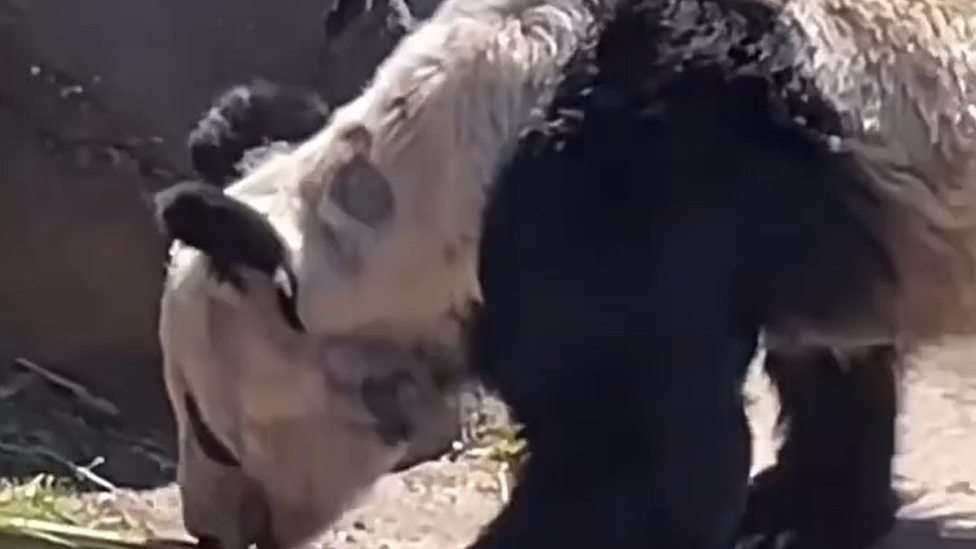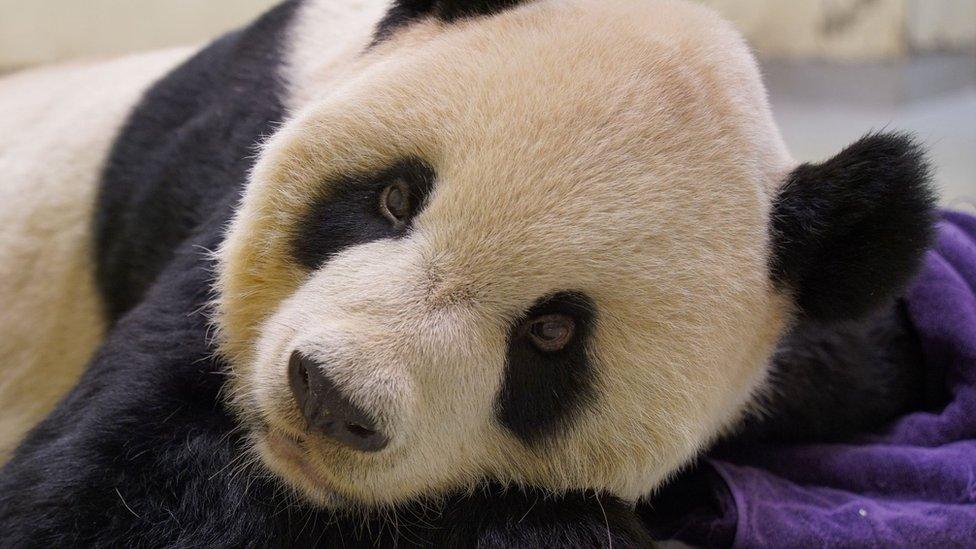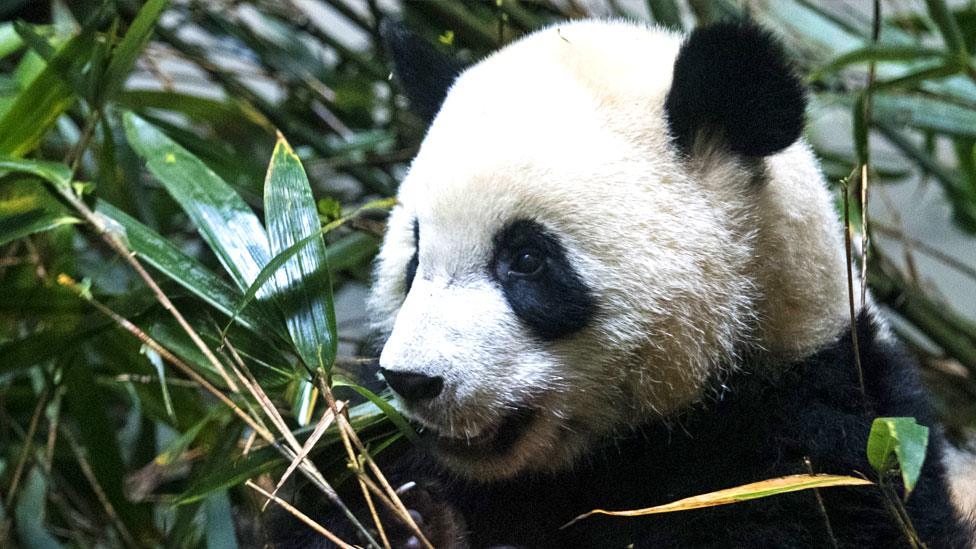Chinese eagerly await return of panda from US zoo
- Published

Ya Ya - pictured in 2020 - has a condition that makes her fur look thin and patchy, Memphis Zoo has said
Millions of Chinese people have a watched a US zoo say goodbye to a giant panda ahead of her much-discussed return home after 20 years.
A farewell party for 22-year-old Ya Ya at Memphis Zoo took place on Saturday.
She and her male mate Le Le, who died in February, had been monitored closely by Chinese people, after questions were raised over their treatment at the zoo.
It has previously denied such allegations and accused activists of spreading false information.
The zoo says Ya Ya has a chronic skin and fur condition, which "occasionally make her hair look thin and patchy".
Around 500 people attended the event in the Tennessee city, which featured Chinese cultural performances and goodbye letters.
Ya Ya was surrounded by bamboo and given a special ice cake made of grapes, sugar cane, and cookies, according to pictures and videos shared online. Many Chinese followed it live online.
"Safe travels Ya Ya. You will be missed by so many," a comment on the zoo's Facebook page read. "We will miss you... You have brought us so much joy," added a user on its Twitter page.
But other comments aimed at the zoo appeared more aggressive. "Stop faking your affection, you make me sick," said one comment in Chinese.
"Ya Ya [has] suffered such a hard time. Come back home - we're all waiting for you," another person wrote.
Ya Ya and Le Le arrived in the Tennessee city in 2003 on loan. China has long used so-called panda diplomacy to help foster relationships with other countries.
But in recent times, Memphis Zoo has been grilled by Chinese netizens over accusations that Ya Ya and Le Le had been mistreated during their stay.
It followed allegations - rejected by the zoo - that the pair had suffered physical and mental diseases.
A video posted by animal advocacy groups In Defense of Animals and Panda Voices last year showed the pandas pacing in circles. The groups said the animals appeared to have lost fur and weight, and called for them to be "returned to China before it's too late".
Zoo officials countered that they were "two of the most spoiled animals on the planet", according to Associated Press.
On its website, the zoo says: "Ya Ya lives with a chronic skin and fur condition. This condition does not affect her quality of life but does occasionally make her hair look thin and patchy. The condition is closely monitored by our animal care team and veterinary staff."

Chinese-Americans have been flying to Memphis to visit Ya Ya and post about her on social media
Months later, the zoo announced they the pandas would be returned to China as an agreement with the Chinese Association of Zoological Gardens had come to an end. It said the decision had nothing to do with pressure from animal advocates, according to Reuters.
But there was renewed anger in China after 25-year-old Le Le's death in February. Although giant pandas usually live for 25 to 30 years in captivity, many questioned whether the animals usually seen as China's "national treasure" were being neglected by zookeepers in the US, when ties between the two countries had already worsened due to diplomatic disputes and trade barriers.
Online, people started pressing for Ya Ya to return to China earlier. Many put up slogans and pictures on various advertisement spots across China and called up relevant departments asking for updates. Some Chinese-Americans even voluntarily flew to Memphis to visit and "guard for Ya Ya".
But Chinese experts flew to the US after Le Le's death and, along with their American counterparts, drew an initial conclusion that he had died of heart disease. They also checked on Ya Ya and determined she had a good appetite and stable weight, other than suffering hair loss due to a skin issue.
Ya Ya is scheduled to return to China by the end of this month, according to Chinese media reports.
On Tuesday, spokesperson of China's ministry of foreign affairs Wang Wenbin said Ya Ya was relatively stable other than the fur loss. "China will get Ya Ya home safely at the fastest speed," he added.
But this hasn't stopped other netizens from raising more questions - including about whether China could move beyond "panda diplomacy".
"When can we be strong enough that we won't need pandas to be our ambassadors," a comment liked by more than 100 times on Chinese platform Weibo reads.
"We can't send another panda to the US ever," another reads.
Related topics
- Published4 January 2023

- Published19 November 2022

- Published9 July 2021

- Published16 April 2022
